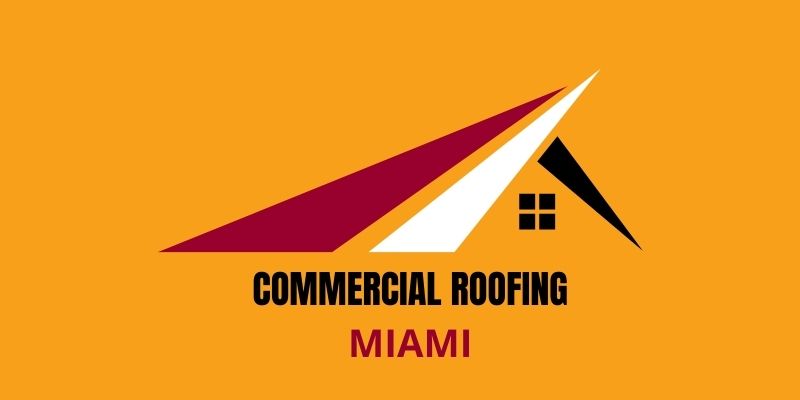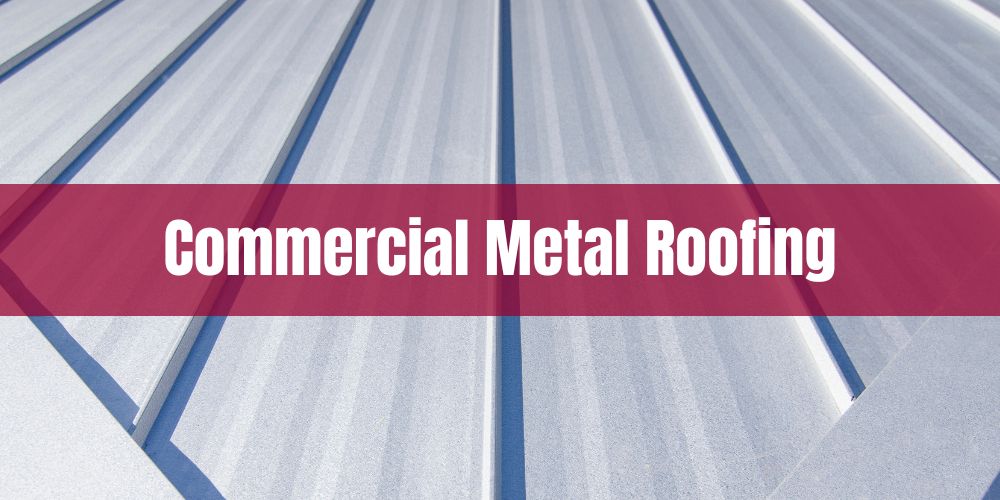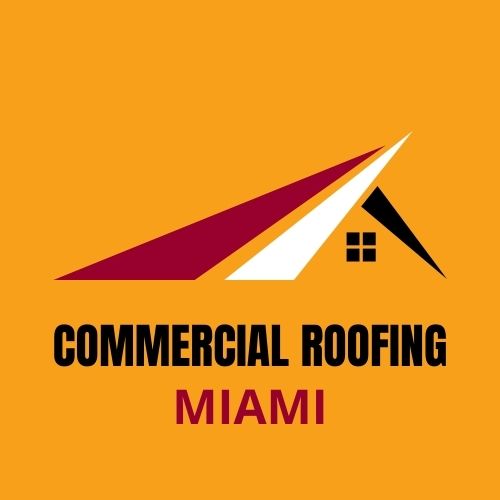Commercial metal roofing involves the installation, repair, and maintenance of metal roofing systems on commercial structures, including offices, warehouses, and industrial facilities. This type of roofing is known for its durability, energy efficiency, and resistance to environmental factors such as extreme weather and UV exposure. Materials commonly used in commercial metal roofing include steel, aluminum, copper, and zinc, each providing a robust barrier against the elements. Commercial metal roofing systems also offer aesthetic versatility, making them suitable for a wide range of architectural styles. Commercial Roofing Miami provide commercial metal roofing services across the Miami, Florida area.
What Is Commercial Metal Roofing?
Commercial metal roofing refers to the use of metal materials for constructing the roofs of commercial buildings. It is renowned for its durability, longevity, and ability to withstand harsh weather conditions. Common materials used in commercial metal roofing include steel, aluminum, copper, and zinc, each offering unique benefits such as corrosion resistance, reflectivity, and strength. Metal roofing systems can be designed in various styles, including standing seam, R panel, and corrugated metal panels, catering to diverse architectural preferences and functional needs. One of the significant advantages of commercial metal roofing is its energy efficiency, as the reflective properties of metal help to deflect sunlight and reduce cooling costs. Moreover, metal roofs are environmentally friendly options due to their recyclability and potential for accommodating renewable energy systems like solar panels.
In Miami, Florida, commercial metal roofing is particularly suited due to its resilience against the region's high humidity, heavy rainfall, and intense sunlight. Installation methods such as using moisture-resistant underlayment and securing metal panels with appropriate fasteners are essential to ensure the roof withstands Miami’s occasional hurricanes and tropical storms.
Have a question about an upcoming project?
What Are The Benefits Of Metal Roofing In Miami's Climate?
Metal roofing is highly suitable for Miami's climate due to its durability and resistance to extreme weather conditions. Miami's tropical monsoon climate features heavy rain, high humidity, and strong winds, all of which a metal roof can effectively withstand. Additionally, metal roofing offers energy efficiency benefits, reflecting sunlight to keep homes cooler and potentially lowering energy costs.
- Weather Resistance: Effectively withstands Miami's high winds, heavy rainfall, and hurricane conditions.
- Durability: Offers a long lifespan, minimizing repair costs in harsh weather.
- Energy Efficiency: Reflects sunlight, reducing cooling needs and lowering electricity bills.
- Mold and Mildew Resistance: Inhibits growth, crucial in Miami's humid atmosphere.
- Low Maintenance: Requires less upkeep despite frequent exposure to adverse weather conditions.
1. Weather Resistance: Effectively withstands Miami's high winds, heavy rainfall, and hurricane conditions.
Weather resistance refers to the capability of a roofing system to endure extreme weather conditions, such as high winds and heavy rainfall, without sustaining damage. Given Miami's susceptibility to hurricanes and frequent storms, a roofing system with high weather resistance is crucial for commercial properties. This ability ensures that businesses can continue operations with minimal disruption despite severe weather events.
Enhanced weather resistance means the roof's material and installation are geared to prevent water ingress, structural damage, and loss of roofing materials during hurricanes. Routine maintenance checks and the use of reinforced materials can further ensure that commercial roofs remain resilient against Miami’s volatile weather. Selecting a roofing system designed for high wind uplift resistance and appropriate drainage solutions can protect both the building's integrity and its contents.
2. Durability: Offers a long lifespan, minimizing repair costs in harsh weather
Durability refers to the ability of commercial roofing systems to withstand extreme weather conditions over time, reducing the frequency and cost of repairs. Durability is particularly advantageous for commercial roofing in Miami’s climate where severe thunderstorms and high humidity are common. Metal roofing, for example, offers superior resilience against such conditions, ensuring longevity and minimizing disruption to business operations.
To enhance durability further, installation of commercial metal roofing in Miami should include proper sealing and fasteners that resist corrosion and uplift. Regular inspections help in timely identification of potential issues like loose panels or rust spots, allowing for proactive maintenance. Such practices not only extend the life of the roofing system but also safeguard the underlying structures from moisture-related damage.
3. Energy Efficiency: Reflects sunlight, reducing cooling needs and lowering electricity bills.
Energy efficiency is the capability of a roofing material to decrease energy consumption, particularly cooling expenses, by reflecting sunlight instead of absorbing it. Energy-efficient roofing is especially beneficial in Miami's hot climate, where high temperatures and intense sunlight necessitate significant cooling efforts. By reflecting sunlight, commercial roofing systems reduce the burden on air conditioning systems and decrease electricity bills, making them a cost-effective option for businesses in warm climates.
Implementing reflective roofing systems can significantly reduce energy usage, contributing to environmental sustainability and cost savings by extending roof life and decreasing reliance on mechanical cooling. Investing in energy-efficient roofing can also enhance building comfort, offering a more consistent indoor temperature. This strategic roofing choice also supports eco-friendly practices and helps mitigate the urban heat island effect prevalent in densely populated areas like Miami.
4. Mold and Mildew Resistance: Inhibits growth, crucial in Miami's humid atmosphere.
Mold and mildew resistance in commercial roofing refers to the ability of roofing materials to prevent the development and spread of fungi, such as mold and mildew, especially in humid climates like Miami's. Mold and mildew resistance is a vital feature for commercial roofing systems in Miami's climate, where high humidity and frequent rainfall create a ripe environment for fungal growth. By preventing mold and mildew proliferation, commercial roofing materials ensure lasting durability and reduce maintenance costs associated with moisture damage and biological growth.
Employing roofing materials with robust mold and mildew resistance helps preserve the structural integrity of commercial buildings by lessening the risk of water infiltration that can damage internal structures. This resistance also contributes to improved indoor air quality by preventing mold spores from entering ventilation systems and affecting occupants' health. Regular inspections and maintenance strengthen the roof's protective capabilities, ensuring the continued suppression of mold and mildew in Miami's challenging climate.
5. Low Maintenance: Requires less upkeep despite frequent exposure to adverse weather conditions
Low maintenance refers to commercial roofing systems designed to withstand harsh weather conditions with minimal need for repairs, cleaning, or other upkeep. The low maintenance characteristic of commercial roofs significantly benefits building owners in Miami, where frequent rain, high humidity, and the threat of hurricanes demand durable roofing solutions. Durable materials like standing seam metal or TPO (Thermoplastic Olefin) can endure high winds and heavy rainfall, reducing the frequency and cost of repairs and maintenance amidst Florida's challenging climate.
Opting for a low maintenance roofing system can also extend the lifespan of a commercial roof, contributing to long-term savings by minimizing repair costs and disruptions due to frequent maintenance needs. Roofing materials known for their resilience can maintain their structural and aesthetic integrity without regular intervention, making them an economically savvy choice. Selecting products that inherently resist the effects of moisture, wind, and UV exposure will ensure the longevity of the roof and a more predictable budget for building maintenance.
How Does Metal Roofing Resist Corrosion In Miami?
Metal roofing resists corrosion in Miami through protective coatings and corrosion-resistant materials. Miami's coastal environment presents challenges due to salt-laden air and high humidity, but advancements in metal roofing technology provide robust solutions. By using materials like galvanized steel or aluminum with protective coatings, metal roofs effectively combat these corrosive elements.
- Protective Coatings: Apply layers to shield against salt-laden air and moisture.
- Galvanized Steel: Uses zinc coating to protect underlying metal from corrosion.
- Aluminum Roofing: Natural resistance to rust and corrosion in humid environments.
- Regular Maintenance: Periodic inspections and cleaning help sustain coating efficiency.
- Proper Installation: Ensures seams and edges are sealed to prevent water intrusion.
1. Protective Coatings: Apply layers to shield against salt-laden air and moisture
Protective coatings are specialized materials applied to commercial roofing surfaces to form a barrier, preventing damage from salt-laden air and moisture typically encountered in coastal environments. Metal roofing in Miami is particularly vulnerable to corrosion due to the high salinity levels in the air and prevailing moisture, making protective coatings essential. By applying these coatings, metal roofs gain an added layer of resistance against oxidization and corrosion, thereby extending their lifespan and maintaining their integrity despite the harsh environmental conditions.
Choosing the right type of protective coating, such as those containing rust-inhibitive properties, is critical to effective corrosion prevention. Regular application of these coatings, combined with routine maintenance, ensures optimal protection and durability of commercial roofs even amidst Miami’s challenging weather patterns. This preventive measure ultimately reduces long-term repair costs and extends the life of the roofing system.
2. Galvanized Steel: Uses zinc coating to protect underlying metal from corrosion
Galvanized steel is a type of metal roofing material that utilizes a protective layer of zinc to prevent rust and corrosion. The zinc coating on galvanized steel acts as a barrier against moisture and oxygen, two primary catalysts of corrosion. This makes it particularly effective in coastal regions like Miami, where the salty air can accelerate the deterioration of unprotected metals.
Galvanized steel roofing is an excellent choice for commercial properties requiring durable and long-lasting materials. Regular maintenance, such as inspections and cleaning, can further enhance its lifespan and corrosion resistance. Investing in galvanized steel can significantly reduce repair costs and maintain the structural integrity of commercial roofs in environments vulnerable to corrosion.
3. Aluminum Roofing: Natural resistance to rust and corrosion in humid environments
Aluminum roofing inherently resists rust and corrosion due to its oxide layer, protecting it from the deteriorating effects of humid environments. In Miami, known for its humid and corrosive conditions, aluminum roofing is especially advantageous as it sustains its integrity and appearance over time without succumbing to rust. This makes it a reliable choice for commercial buildings seeking durability and low maintenance in challenging climates.
The longevity of aluminum roofing ensures that commercial property owners face less frequent replacement and repair costs, providing significant long-term savings. Additionally, aluminum’s lightweight nature eases structural load, making it suitable for both new projects and retrofits without the need for extensive structural modifications. Regular inspections still play a role in ensuring that the roofing material functions effectively, maintaining protective coatings that might augment aluminum's abilities in especially harsh conditions.
4. Regular Maintenance: Periodic inspections and cleaning help sustain coating efficiency.
Regular maintenance in commercial roofing involves periodic inspections and cleaning to ensure that protective coatings remain effective in extending the roof's lifespan. In Miami, where the climate is characterized by high humidity and frequent rain, regular maintenance is crucial to ensure metal roofing systems continue to resist corrosion. By routinely inspecting and cleaning the roof, any buildup of debris or organic matter that could lead to corrosion is promptly removed, keeping the protective coatings intact and effective.
Further, regular maintenance also allows for early detection of minor issues, such as small scratches or abrasions on the coating, before they can evolve into more significant problems affecting the roof's performance. Consistent care during inspections can reveal areas needing touch-ups or repairs, ensuring continuous protection against Miami's corrosive environmental conditions. Additionally, maintaining proper records of these maintenance activities can help in scheduling timely recoating, aligning with manufacturer recommendations to fortify resistance against corrosion.
5. Proper Installation: Ensures seams and edges are sealed to prevent water intrusion.
Proper installation in commercial roofing requires meticulous sealing of seams and edges to prevent water from penetrating and compromising the roofing system. Ensuring that seams and edges are thoroughly sealed is crucial for commercial roofs in areas like Miami where the frequent rain and high humidity present ongoing challenges. Without proper sealing, water can easily enter through vulnerabilities, leading to water damage and mold growth, which can undermine the roof's integrity and require costly repairs. The humid tropical climate in Miami demands that commercial roofs are installed with a particular focus on watertight sealing to combat these risks effectively.
Regular maintenance and inspections are necessary to ensure that the seals remain intact and effective over the roof's lifespan. Using high-quality materials and sealants designed to withstand extreme weather conditions further supports the roof’s long-term performance. Additionally, engaging skilled roofing professionals for the installation ensures that every detail, down to the smallest seam, is expertly handled, providing clients with the peace of mind that their roofs will resist Miami's typical weather challenges.
What Are Common Issues With Metal Roofs In Miami?
Common issues with metal roofs in Miami include corrosion, thermal expansion, and storm damage. The hot, humid climate and proximity to saltwater can accelerate rusting, while frequent temperature changes can cause metal expansion. Additionally, Miami's frequent storms and hurricanes test the durability of metal roofing materials.
- Corrosion: Humid, salty air promotes faster rusting and metal degradation.
- Thermal Expansion: Frequent temperature changes cause metal panels to expand and contract.
- Storm Damage: Strong winds and flying debris during hurricanes can dent or puncture roofs.
- Leakage: Improper installation can lead to water leakage at seams or fasteners.
- Noise: Heavy rain or hail can be particularly loud on metal roofing surfaces.
1. Corrosion: Humid, salty air promotes faster rusting and metal degradation
Corrosion is the process by which humid, salty air accelerates the rusting and deterioration of metal roofing materials. In Miami, where the climate is characterized by high humidity and proximity to the ocean, metal roofs are particularly vulnerable to corrosion. The salty air acts as a catalyst, speeding up the oxidation process, which breaks down the protective coatings on metal surfaces, leading to structural weakness.
This makes regular maintenance and the use of corrosion-resistant materials or coatings essential for commercial roofs in such coastal environments. Implementing preventive measures, such as applying protective paint or sealants, can prolong the lifespan of metal roofs. Routine inspections can help detect early signs of corrosion, allowing for timely intervention before extensive damage occurs, safeguarding both the roof and associated structures.
2. Thermal Expansion: Frequent temperature changes cause metal panels to expand and contract.
Thermal expansion is the phenomenon where metal roofing panels undergo size changes due to fluctuations in temperature, potentially leading to structural issues. Thermal expansion is a critical consideration for metal roofs in Miami, where the climate sees considerable temperature variations between day and night. This constant expansion and contraction can exert stress on the metal panels, leading to potential warping, fastener issues, or sealant failures over time.
To address thermal expansion in metal roofing, it is important to use fasteners that allow for movement and accommodate these dimensional changes. Installing thermal breaks or expansion joints can also compensate for temperature-induced expansions. Regular inspections and maintenance are crucial to identify and correct any issues before they compromise the roof's integrity.
3. Storm Damage: Strong winds and flying debris during hurricanes can dent or puncture roofs.
Storm damage refers to the harm caused to roofing systems by severe weather conditions, such as high winds and debris during hurricanes, which can result in dents, punctures, and compromised structural integrity. In Miami, frequent hurricanes pose a significant threat to metal roofs, making them vulnerable to storm damage. The force of wind and debris during such events can lead to severe denting or penetration of the metal roofing, impacting its durability and protective capabilities.
To mitigate damage, it's crucial for commercial buildings to select impact-resistant metal roofing materials rated for hurricane-prone areas. Regular inspections and maintenance, especially before storm season, can help detect vulnerabilities early and ensure the roof is fortified against potential hurricane impacts. Prompt repairs to any minor damages can prevent further degradation or costly replacements, thus preserving the building's integrity.
4. Leakage: Improper installation can lead to water leakage at seams or fasteners.
Leakage in commercial roofing refers to the ingress of water through improperly installed seams or fasteners, compromising the integrity of the roof system and potentially causing internal damage to the building. Water leakage is a critical issue for metal roofs in Miami due to the region’s frequent heavy rainfalls and high humidity levels. These conditions exacerbate the consequences of even minor installation errors, turning them into significant causes of indoor water damage, mold growth, and structural deterioration, particularly in commercial buildings.
To address leakage issues, it is essential to ensure that installation is conducted by experienced professionals who adhere to manufacturer guidelines and best practices. Regular maintenance and inspections can help detect early signs of seam or fastener problems, allowing for swift remedial action before more extensive damage occurs. Additionally, using high-quality materials and sealing products during installation can reduce the risk of leakage and enhance the roof's longevity and performance.
5. Noise: Heavy rain or hail can be particularly loud on metal roofing surfaces
This noise issue refers to the amplified sound generated when rain or hail strikes the surface of a metal roof, which can be disruptive in commercial environments. In Miami, where tropical climates often bring heavy rainstorms and occasional hail, the noise generated by weather events on metal roofing surfaces can be a significant concern for businesses. This can affect the productivity and comfort level within commercial buildings, leading owners to consider alternative solutions or enhancements to mitigate the noise.
Additionally, employing sound-dampening insulation or installing a roof underlayment can help reduce the noise impact of rain and hail on metal roofs. Building owners can also explore designs that incorporate acoustic barriers or utilize roof coatings that minimize sound transmission. By addressing the noise concern, businesses can create a more serene environment that enhances employee concentration and overall client experience.


